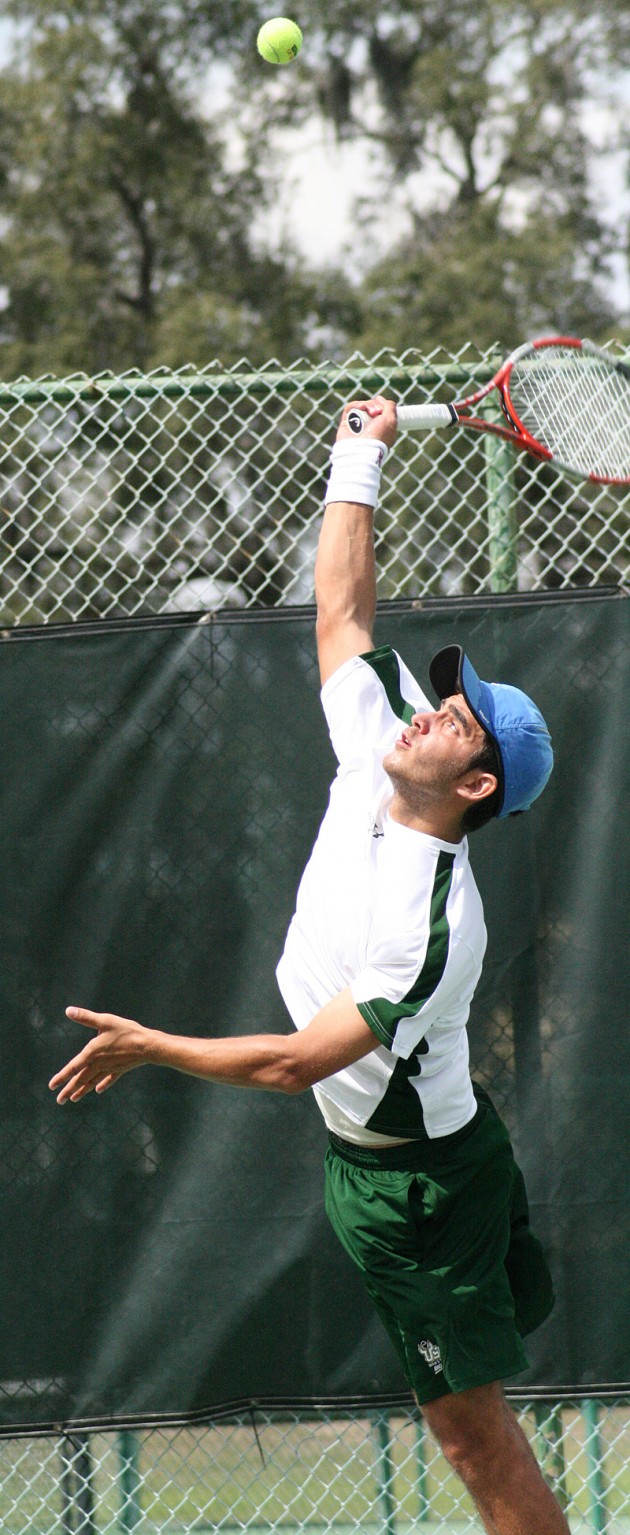Remembering his roots

USF senior Mahmoud Hamed will never forget the relationship he had with his grandfather, Said Abd-Rabbo.
With Abd-Rabbo’s guidance and teaching, Mahmoud grew into the tennis player he is today, but their relationship carried far beyond the court.
Mahmoud’s mother, Fatima, said her father always wanted a son but had three daughters. When his grandson came into the world, “it was love at first sight.”
Abd-Rabbo taught Mahmoud about Islam, history, politics, humbleness, thankfulness and helping others.
“He always showed (Mahmoud) how proud he was of him,” Fatima said. “He supported him with good advice in all matters of life.”
Six years ago, Abd-Rabbo developed an infection after an operation on his digestive system and died shortly after.
“It was tough,” Mahmoud said, looking at the floor. “Everything I have to do with tennis was only because of him.”
Fatima said dealing with her father’s passing is still difficult.
“We still feel lots of pain and deep sorrow,” she said. “Mahmoud was upset but put all his energy into his work and tennis and dedicated the success he has to his grandfather.”
A year before Abd-Rabbo’s death, Mahmoud’s father Bahaa was diagnosed with thyroid cancer, but made a full recovery.
Bahaa attended all Mahmoud’s matches and traveled with him to tournaments when he was growing up.
“My dad was always there for me,” Mahmoud said. “I wouldn’t be where I am now if (my parents) wouldn’t have helped me.”
The 5-foot-9 senior shares a connection with his father and grandfather because Mahmoud has also faced death. He was born without a pulse and doctors feared he wouldn’t live.
“He was totally blue and had to be (resuscitated) because his lungs were full of water,” Fatima said. “When I woke up from anesthesia, I overheard my mother-in-law saying that they would not give him a name, because perhaps he wouldn’t make it.”
Fatima waited two weeks to give him a name while her son was kept in an incubator at the hospital.
“I kept hoping for six months he would not be mentally retarded because of the lack of oxygen when he was born,” she said. “This is what tied me most to Mahmoud, because I wished and prayed he would live.”
Mahmoud said the adversity he has faced in life and the influence of his family have led him to success in the sport he loves.
While attending American University in Cairo, Mahmoud was Egypt’s universities champion in 2005, and last summer he won a spot on the Egyptian Davis Cup Team — which comprises the top four players in the country.
“For every athlete, the best feeling is to represent your country in a tournament,” he said. “I always wanted to be a part of the team. It was one of the best moments for me.”
When Mahmoud came to USF two years ago, it was the first time he had been to the United States.
“The first two weeks were very tough,” he said. “I still couldn’t believe I was here in another continent.”
The importance of sports in America surprised Mahmoud.
“If you play sports here, people respect you,” he said. “In Egypt, we don’t have trainers, you have to take care of yourself.”
Mahmoud, 22, played on the professional tennis circuit last semester, traveling to places like Morocco, Egypt, Tunisia and Greece. He chose to travel the circuit in the fall to be eligible to play for the Bulls this semester.
“He could have graduated early, but he wanted to come back and help us do even better this year … That’s the beauty about Mahmoud — he’s just so hungry to do the best he can every time he steps out there,” said coach Don Barr.
As the Bulls’ only senior, Mahmoud serves as the team leader.
“He’s always looking out for everyone’s best interest,” said freshman Mark Oljaca. “He wants us to be successful. I admire him.”
Junior Thomas Estrada said he shares a special relationship with Mahmoud. The two are close friends.
“I felt so much support with him,” Estrada said. “When I’m down, either in my personal life or in tennis, he’s always got my back and cheering me up. That’s why he’s one of my best friends on the team.”
Instead of calling himself a team leader, Mahmoud carries an attitude his grandfather
taught him.
“If I notice someone needs help, I offer them help,” he said. “If someone needs to talk, I never impose it on them. I just say, ‘OK, if you need to talk about it, I’m there.'”
Mahmoud has been through tough times, but his family’s influence has helped him keep a positive outlook on life.
“If you’re going through a hard time, you can only think it’s going to get better,” he said.





